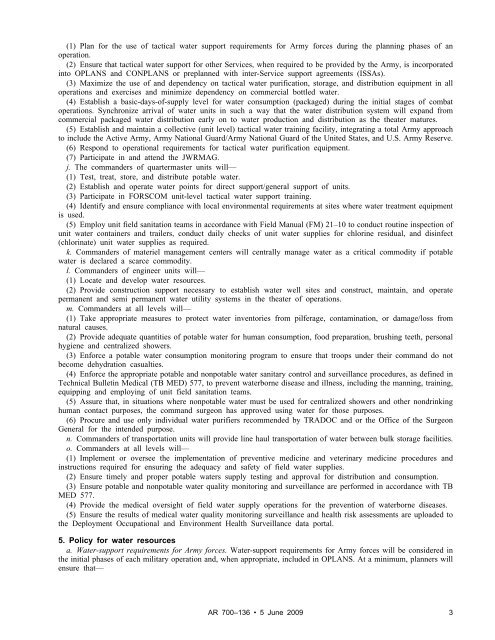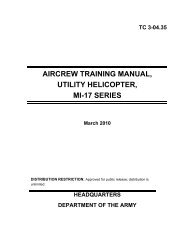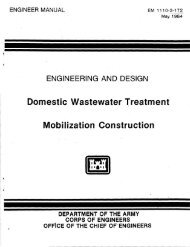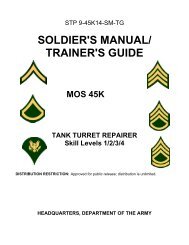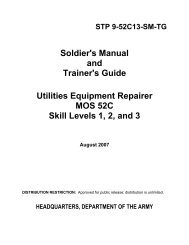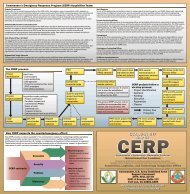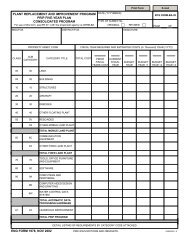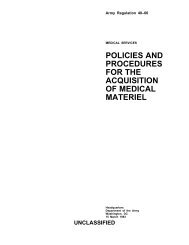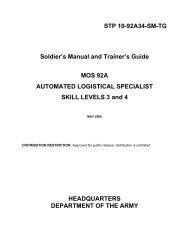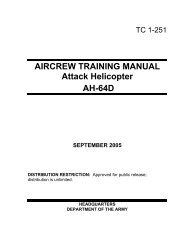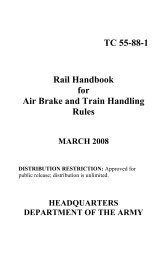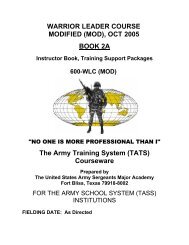Tactical Land- Based Water Resources Management - Leader ...
Tactical Land- Based Water Resources Management - Leader ...
Tactical Land- Based Water Resources Management - Leader ...
Create successful ePaper yourself
Turn your PDF publications into a flip-book with our unique Google optimized e-Paper software.
(1) Plan for the use of tactical water support requirements for Army forces during the planning phases of anoperation.(2) Ensure that tactical water support for other Services, when required to be provided by the Army, is incorporatedinto OPLANS and CONPLANS or preplanned with inter-Service support agreements (ISSAs).(3) Maximize the use of and dependency on tactical water purification, storage, and distribution equipment in alloperations and exercises and minimize dependency on commercial bottled water.(4) Establish a basic-days-of-supply level for water consumption (packaged) during the initial stages of combatoperations. Synchronize arrival of water units in such a way that the water distribution system will expand fromcommercial packaged water distribution early on to water production and distribution as the theater matures.(5) Establish and maintain a collective (unit level) tactical water training facility, integrating a total Army approachto include the Active Army, Army National Guard/Army National Guard of the United States, and U.S. Army Reserve.(6) Respond to operational requirements for tactical water purification equipment.(7) Participate in and attend the JWRMAG.j. The commanders of quartermaster units will—(1) Test, treat, store, and distribute potable water.(2) Establish and operate water points for direct support/general support of units.(3) Participate in FORSCOM unit-level tactical water support training.(4) Identify and ensure compliance with local environmental requirements at sites where water treatment equipmentis used.(5) Employ unit field sanitation teams in accordance with Field Manual (FM) 21–10 to conduct routine inspection ofunit water containers and trailers, conduct daily checks of unit water supplies for chlorine residual, and disinfect(chlorinate) unit water supplies as required.k. Commanders of materiel management centers will centrally manage water as a critical commodity if potablewater is declared a scarce commodity.l. Commanders of engineer units will—(1) Locate and develop water resources.(2) Provide construction support necessary to establish water well sites and construct, maintain, and operatepermanent and semi permanent water utility systems in the theater of operations.m. Commanders at all levels will—(1) Take appropriate measures to protect water inventories from pilferage, contamination, or damage/loss fromnatural causes.(2) Provide adequate quantities of potable water for human consumption, food preparation, brushing teeth, personalhygiene and centralized showers.(3) Enforce a potable water consumption monitoring program to ensure that troops under their command do notbecome dehydration casualties.(4) Enforce the appropriate potable and nonpotable water sanitary control and surveillance procedures, as defined inTechnical Bulletin Medical (TB MED) 577, to prevent waterborne disease and illness, including the manning, training,equipping and employing of unit field sanitation teams.(5) Assure that, in situations where nonpotable water must be used for centralized showers and other nondrinkinghuman contact purposes, the command surgeon has approved using water for those purposes.(6) Procure and use only individual water purifiers recommended by TRADOC and or the Office of the SurgeonGeneral for the intended purpose.n. Commanders of transportation units will provide line haul transportation of water between bulk storage facilities.o. Commanders at all levels will—(1) Implement or oversee the implementation of preventive medicine and veterinary medicine procedures andinstructions required for ensuring the adequacy and safety of field water supplies.(2) Ensure timely and proper potable waters supply testing and approval for distribution and consumption.(3) Ensure potable and nonpotable water quality monitoring and surveillance are performed in accordance with TBMED 577.(4) Provide the medical oversight of field water supply operations for the prevention of waterborne diseases.(5) Ensure the results of medical water quality monitoring surveillance and health risk assessments are uploaded tothe Deployment Occupational and Environment Health Surveillance data portal.5. Policy for water resourcesa. <strong>Water</strong>-support requirements for Army forces. <strong>Water</strong>-support requirements for Army forces will be considered inthe initial phases of each military operation and, when appropriate, included in OPLANS. At a minimum, planners willensure that—AR 700–136 • 5 June 20093


